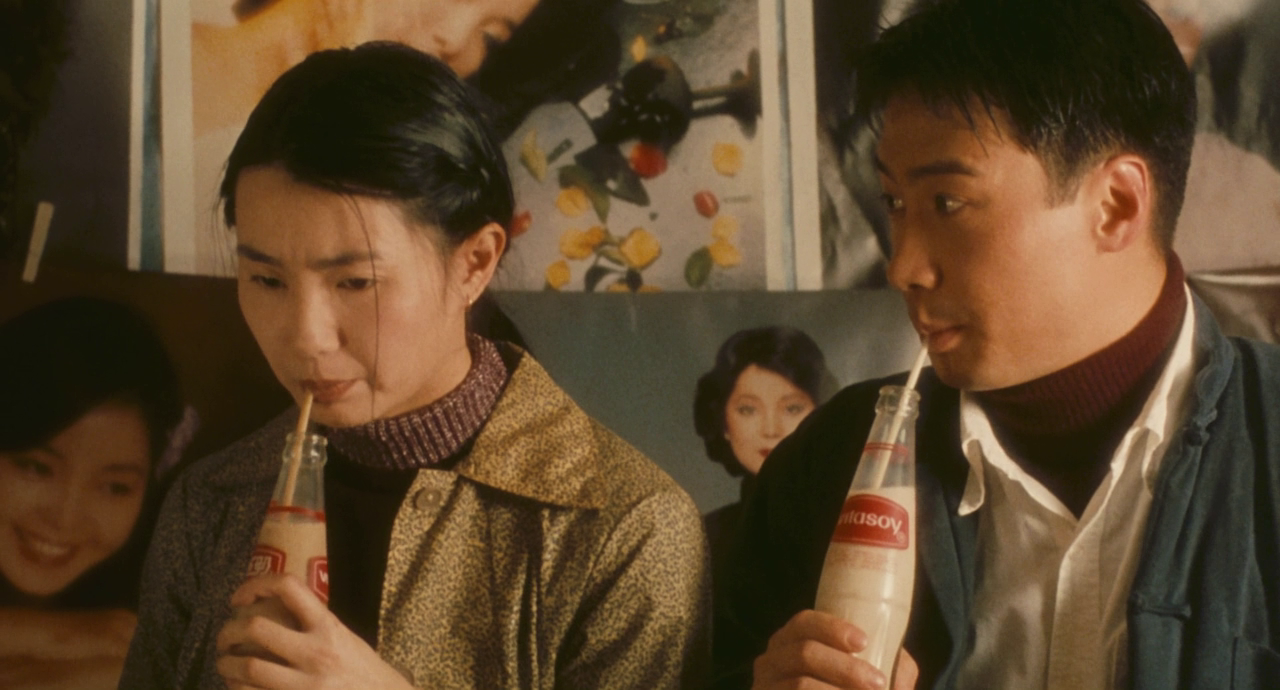Comrades, Almost a Love Story (Peter Chan, 1996)

A descendant of Pál Fejős’s 1928 Lonesome, about two people who find love in the urban crowd and then lose it. The crowd here is Hong Kong in 1986 and the people are Maggie Cheung and Leon Lai. Freshly emigrated from Northern China, Lai barely speaks Cantonese or English but gets a tiny space to live in and a job delivering chickens by bicycle. On his long-anticipated first trip to McDonalds, he meets Maggie Cheung, who knows the lingo(s) and offers to help him get English lessons (from none other than Christopher Doyle). They become friends, and then friends who sleep together. They fall in love to the sounds of Teresa Teng, the Taiwanese singer who was wildly popular in the Mainland in the 70s and early 80s: their fandom marks them as outsider hicks in trendy, ultra-modern, present-obsessed Hong Kong. But inevitably they break-up because Lai has a girlfriend back home and Cheung has a dream of financial, not domestic, success.
A few years later, they meet again, Lai married to the girl from home and Cheung shacked up with Eric Tsang, a Triad boss with a heart of gold (a rare serious performance from Tsang, normally a lunatic ball of farcical nonsense). But again the timing is not right, and a brief failure to maintain mere friendship ends in rain-drenched heartbreak. The film’s final sequences are almost entirely dialogue-free. Several years and another continent later, Cheung and Tsang are hiding out in New York, while Lai is working at a Chinatown restaurant. Cheung thinks she glimpses Lai and chases him through Times Square, but she loses him in the crowd. A few years later, hearing the news that Teresa Teng died, Cheung wanders the streets, Teng’s music running through her head. She stops to watch the news on some TVs in a shop window and as the music swells, notices that Lai has been standing next to her, watching the same news. The film ends on their smiles, followed by a brief coda recasting the opening shot of Lai’s arrival in Hong Kong on the train, we learn that Cheung arrived on that train as well, that the two had been sitting next to each other the whole time, sleeping back to back, their heads ever so slightly touching.
Director Peter Chan takes an unusual approach to the urban-isolation romance. Rather than frame his characters in long shots, emphasizing the crowds around them (as in Lonesome) or their missed connections (as in Johnnie To and Wai Ka-fai’s Turn Left, Turn Right), he shows them in tight close-ups and two shots, adoringly close explorations of the stars’ lovely faces. While there are occasional establishing shots of crowds (Lai bicycling through the Tsim Sha Tsui district, narrating his life in a letter home; Lai navigating a crowd lined up for new housing, bringing water and chocolate to Cheung), for most of the film we are seeing the two leads either alone or alone together (a few times from the point-of-view of an ATM machine, the pair alone in a small square patch of screen space) while the world outside is reduced to blurry, fragmented noise. Even Eric Tsang is introduced to us only in pieces: first his massive, tattooed back, then brief glimpses of his face. It’s not until his relationship with Cheung is established that we see him as a whole.
Similarly we snatch bits of other romances that surround them: Christopher Doyle and Lai’s Thai hooker roommate Cabbage, barely dramatized but which will end sadly; Lai’s aunt and her obsession with a single night she claims she spent with William Holden, the high point of her life, a night so perfect the rest of her life could never hope to match it; even the sad story of Teresa Teng, a star beloved in her youth who died young at 42. The flip side of romance is tragedy, just as the immigrant’s dream is a romantic one, the yearning for a better world, for perfection, and the failure to realize it, or, even worse, of finding it and failing to keep it. The film captures this whole range, and thus is Comrades the most romantic of films, not just a love story (almost).
